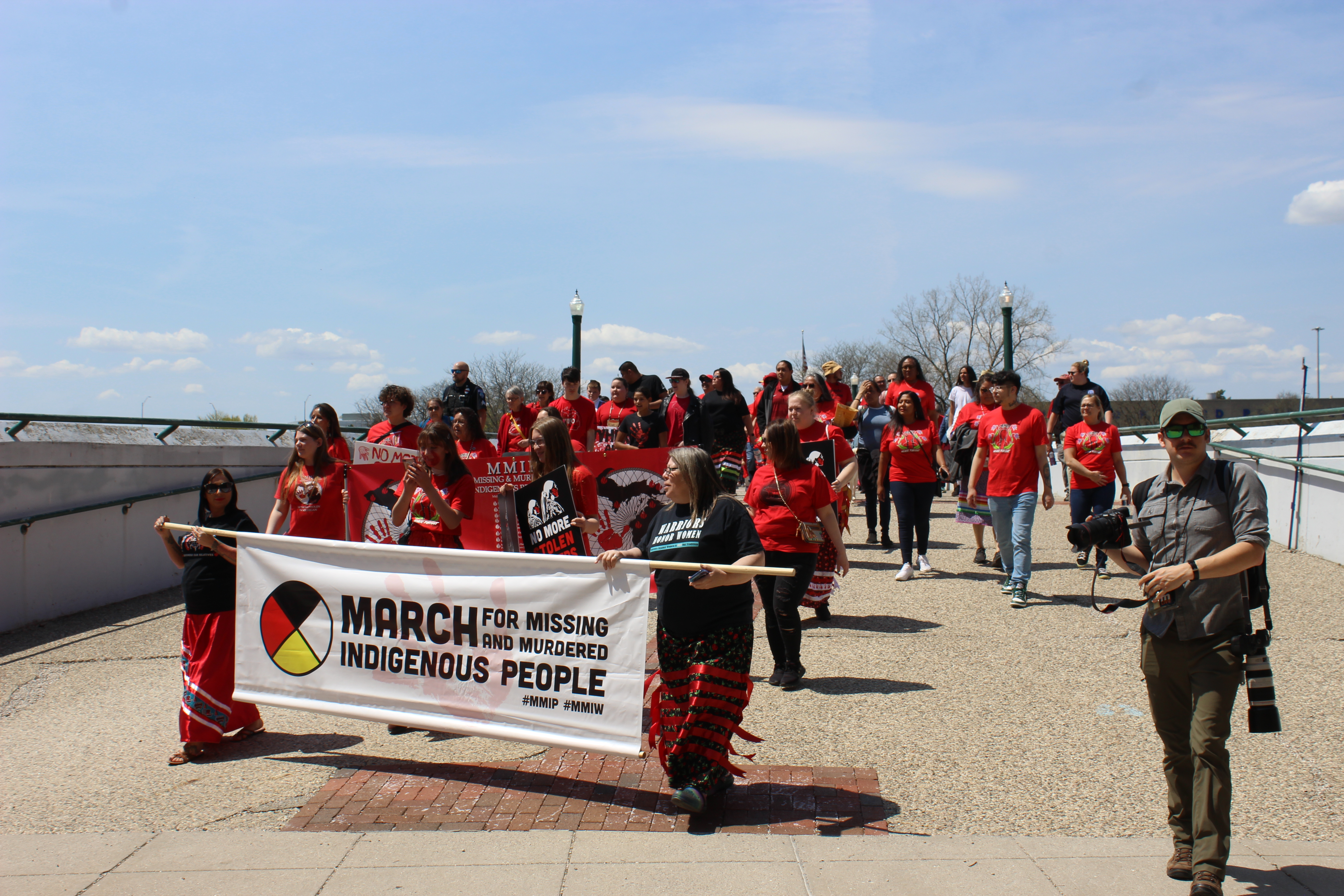
- Details
- By Levi Rickert
GRAND RAPIDS, Mich. — The gathering of hundreds of Anishinaabeg and supporters in Ah-Nab-Awen Park to observe Missing and Murdered Indigenous Persons Awareness Day (MMIP Awareness Day) on the banks of the Owashtinong (Grand River) in downtown Grand Rapids, Mich. on Friday, May 5, 2022 was just one of dozens held around the country.
It should be noted that May 5 was not randomly chosen to bring awareness to the epidemic violence against Indigenous people. The date was selected because the Montana congressional delegation persuaded the U.S. Senate to pass a resolution declaring the national day of awareness because May 5 was the birthday of Hanna Harris, a 21-year-old member of the Northern Cheyenne tribe who went missing on July 4, 2013.
Harris is just one of thousands of Indigenous people who have gone missing and are found murdered. The severe problem has gained national attention. MMIP Awareness Day has generated interest in solving the epidemic.
Indigenous women and girls living on reservations experience murder rates of more than 10 times the national average, and more than 4 out of 5 Indigenous women have experienced violence. While the numbers are so horrific for Indigenous women and girls, in recent years men and boys have been included in the national awareness day.
"Today is very important to us, not just my tribe, but all 12 federally recognized tribes of Michigan. It is important that all of the 12 sovereign tribes work together united to make sure we take matters into our own hands as we are doing to today to acknowledge the problem," Jamie Stuck, chairman of the Nottawaseppi Huron Band of the Potawatomi (NHBP) and chairman of the United Tribes of Michigan told Native News Online before the beginning of the rally.
"We want to make sure that we have a unified front overall. We need to be united on social media. We need grassroots in the streets. We need strong legislation, we need better behavioral health, not only for our victims, but for those that are the victimizers. They need help," Stuck said.
Melissa Issac (Saginaw Chippewa Tribe of Michigan), who leads the Indigenous Education Initiative for the Michigan Department of Education, served as the emcee for the rally that included a march through the streets of Grand Rapids.
"We come today to share our stories and to show our solidarity to those who have been impacted by missing and murdered Indigenous people," Issac said. "It's okay to cry and it's also okay to laugh because we know our laughter is part of the healing process."
The chairman of the Match-E-Be-Nash-She-Wish Band of Pottawatomi Indians (commonly known as the Gun Lake Tribe) Bob Peters said to Native News Online the rally and march was held for all Native Americans in the country, not just local tribal communities.
"I am very humbled to be here today to march and say a few words. This is for our people and we are going to continue to do this every year and we're going to pick up traction so that hopefully, this will just be a memory," Peters said.
Peters also said his tribe hold prevention trainings so that their citizens can learn how to avoid human trafficking that contributes to people who go missing.
On Thursday, for the third year in a row, President Joe Biden issued a proclamation declaring May 5 to be Missing or Murdered Indigenous Persons Awareness Day.
“For the thousands of families who have lost or are still looking for a friend or loved one, I know this day is full of purpose and pain. Know that your fight to cast light on these injustices has already saved lives,” President Biden said in his proclamation. “Our Government has a solemn obligation to ensure that every case of a missing or murdered Indigenous person is met with swift, effective action to finally bring justice and healing. Together, we will get that done”

Michigan Governor Gretchen Whitmer proclaimed May 5 as Murdered and Missing Indigenous Persons Awareness Day in Michigan. She said state and local government with tribal communities should increase awareness of and provide resources for missing and murdered Indigenous peoples.
“We reaffirm our commitment to honor the lives of murdered and missing American Indian and Alaska Native peoples, particularly women and girls, and continue to shine a light on egregious and unconscionable treatment toward and against American Indian and Alaska Native peoples,” the proclamation states.
On Friday, the Democratic National Committee (DNC) Chairman Jaime Harrison and DNC Native Caucus Chair Clara Pratte released a statement in recognition of MMIP Awareness Day.
“On Missing or Murdered Indigenous Persons Awareness Day, we acknowledge the crisis of murdered and missing Indigenous people, and reflect on the generations of Indigenous persons who have been forced to face the devastating reality of the murder or disappearance of a loved one,” the statement says.
“As we continue working together to address the tragedy of the alarming rates of missing and murdered Indigenous people in this country, Democrats remain committed to taking action to ensure the safety of our Indigenous communities and find justice for those lost.”
https://nativenewsonline.net/currents/hundreds-gather-in-downtown-grand-rapids-to-missing-or-murdered-indigenous-persons-awareness-day#sigProId2f0462a2d6
More Stories Like This
Native News Weekly (August 25, 2024): D.C. BriefsNavajo Nation Mourns the Passing of Former Vice President Rex Lee Jim
Deb Haaland Earns Endorsement From Communications Workers of America Local 7076
University Soccer Standout Leads by Example
Two Native Americans Named to Democratic Congressional Campaign Committee's“Red to Blue” Program
Help us defend tribal sovereignty.
At Native News Online, our mission is rooted in telling the stories that strengthen sovereignty and uplift Indigenous voices — not just at year’s end, but every single day.
Because of your generosity last year, we were able to keep our reporters on the ground in tribal communities, at national gatherings and in the halls of Congress — covering the issues that matter most to Indian Country: sovereignty, culture, education, health and economic opportunity.
That support sustained us through a tough year in 2025. Now, as we look to the year ahead, we need your help right now to ensure warrior journalism remains strong — reporting that defends tribal sovereignty, amplifies Native truth, and holds power accountable.
 The stakes couldn't be higher. Your support keeps Native voices heard, Native stories told and Native sovereignty defended.
The stakes couldn't be higher. Your support keeps Native voices heard, Native stories told and Native sovereignty defended.
Stand with Warrior Journalism today.
Levi Rickert (Potawatomi), Editor & Publisher



